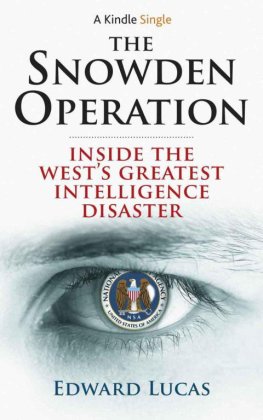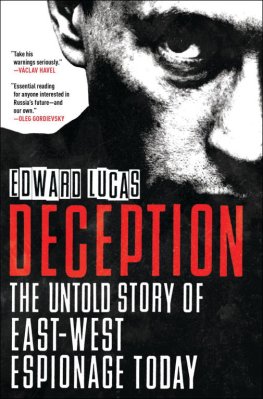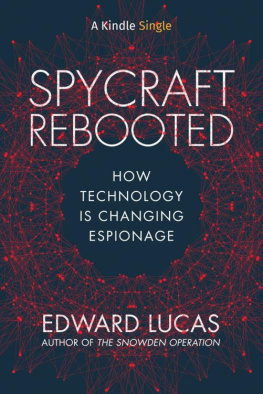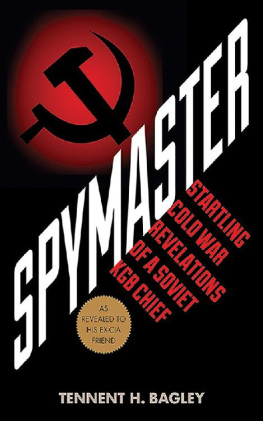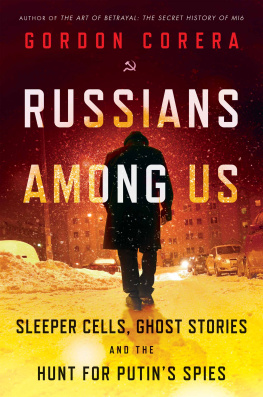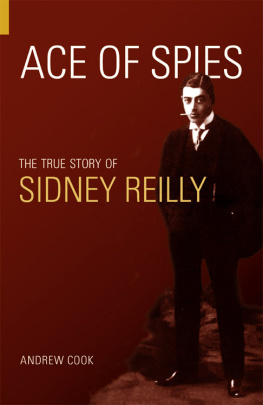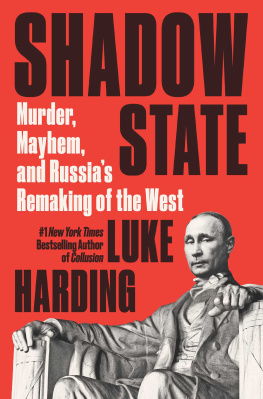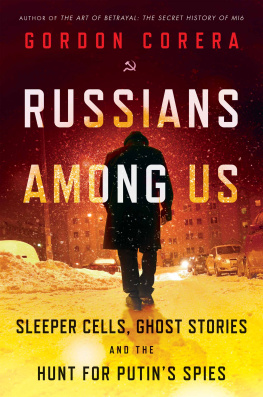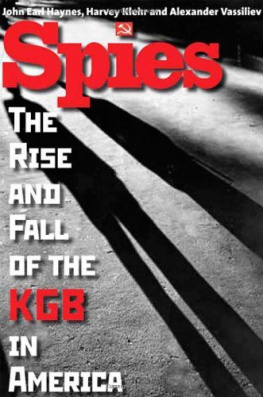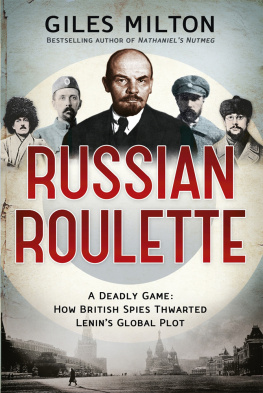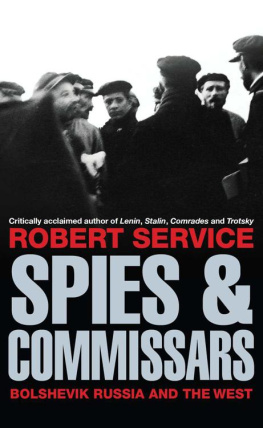Meelis Saueauk of Estonias Institute for Historical Memory kindly helped me find KGB documents about Operation Jungle from Estonian and Latvian archives. Ivo Juurvee also provided important examples of Soviet-era propaganda. Ritvars Jansons at the Occupation Museum in Riga generously shared his insights. Mra Grnberga helped me find her article about the remarkable Mr Pnups. Prokop Tomek in Prague shared his research on Miloslav Kroa and his daughter. Tom Bower effortlessly unearthed his twenty-year-old notebooks and lent me his unique copy of the film Red Web . Tina Tamman helped me track down Alexander Koppel, whose daughter Catherine and son-in-law Michael Breslin provided kind hospitality. Juho and Janno Kiik readily shared their memories of Voldemar. Ben Judah provided excellent research on Anna Chapmans life in Russia. Sam Donaldson in Dublin investigated the mysteries of Rossmore Grove. I am grateful to all of them, and to the people I have quoted. Bill Swainson at Bloomsbury deftly untangled the books structure and helped me signpost it for a wider audience. Zoe Waldie at Rogers, Coleridge and Wright calmed my jitters.
My children Johnny, Hugo and Izzy uncomplainingly put up with my physical and mental absences. My wife Cristina Odones critique was invaluable, as were her love and patience from beginning to end. In 1970 s Oxford, my father J.R. Lucass thoughts on espionage and communism inspired this book; it is dedicated to him and my mother Morar, who have been my unfailing support for fifty years. I am grateful to my editors at the Economist for giving me a sabbatical, and to my colleagues, particularly Ludwig Siegele, John Peet, Tom Nuttall and Bruce Clark, for uncomplainingly covering for my absences. However, the views, and mistakes, in this book are mine alone.
I owe a great debt to people who must remain nameless. They know who they are.
No government agency has sponsored or censored this book.
Edward Lucas is a senior editor at the Economist . He has been covering Eastern Europe since 1986 , with postings in Berlin, Moscow, Prague, Vienna and the Baltic states. He is the author of The New Cold War ( 2008 ), published in more than fifteen languages.
The New Cold War
Life in Moscow can seem remarkably normal. Middle-class professionals wear the same clothes, drive the same cars, take the same holidays, eat the same food and do the same jobs as millions of their counterparts in cities all round the world. This is especially so in the field of finance. Shares and profits rise on the back of Russias oil and gas boom, and the consumption it pays for. Financiers invest; their lawyers handle the details and deal with problems. Serving them is a growing Russian middle class of articulate, confident English-speaking professionals who could easily do the same jobs in New York, London, Frankfurt or Dubai. For many people, especially those who believe Russia is on the right track, the growth of the financial and legal system in Moscow is one of the great grounds for optimism. Other parts of life in Russia, from traffic-clogged big-city streets and corrupt officialdom to terrorism and bubbling civil war along the countrys southern fringe, may be depressing, chaotic, dark and even dangerous, but that world seldom touches the bright, snazzily furnished offices of central Moscow.
In the case of Sergei Magnitsky, however, it did. His name is not well known, though it deserves to be. His story provides a moral and human backdrop to the subsequent chapters on the wiles and ways of Russias spies. Aged only when he died in 2009 , Mr Magnitsky was part of the first generation of Russians for nearly a century whose lives were unclouded by fear. When Soviet controls over speech, belief and travel withered, he was a teenager. He was well-educated in a way that previous cohorts of Russian students could only dream of. His mind was not shaped by forced study of the perverse doctrines of MarxismLeninism but by adherence to the crystalline principles of the law. Neither brutalised by Soviet-era conscription nor burdened by compromises of adult life under totalitarianism, he enjoyed the middle-class comforts and certainties that are taken for granted in the West and had been unimaginable in the Soviet Union. He had able colleagues, stimulating challenges and a happy home. His dream, like the half-successful reformers of the Tsarist era a century earlier, was for Russia to be a law-governed state. He was the sort of person who made even sceptics feel that Russias long-term future was bright.
Polished and polyglot, Mr Magnitsky was the kind of Russian that readers of this book could easily encounter. You might have a drink with him on a foreign holiday, hear him at a seminar, or find him sitting across the table at a business meeting. In that sense, he is rather like the other Russians covered in this book: the undercover spies in the West. It is easy to imagine him sipping a cocktail in London with Ms Chapman, or strolling the streets of Boston in conversation with Donald Heathfield her superspy colleague who worked as a management consultant in America. But while these people were pursuing their clandestine missions on behalf of Russias spymasters, Mr Magnitsky was involved in another story. It involves colossal sums of money, extraordinary cruelty and impunity for wrongdoers. The cast includes senior members of the FSB, working hand in hand with organised crime and senior state officials.
I will begin by introducing the man who unwittingly brought Mr Magnitsky to his doom, and since then has campaigned untiringly for his cause. William (Bill) Browder is an American-born financier, now with British nationality, who used to be one of the best-known Western investors in Russia. He is an abrasive, mercurial figure, bursting with nervous energy, capable of charm and fury in quick succession. He has a fascinating family background: his grandfather Earl Browder was a leader of the American Communist Party. But it was capitalism not communism that entranced the grandson. He spotted in the 1990 s that many outsiders were overestimating the risks of doing business in Russia. Admittedly, the dangers were great: the rule of law was weak, property rights flimsy, political stability uncertain, the economy rocky, and crime and corruption pervasive. But daunting does not mean impossible. The companies and shares on sale were not valueless, just cheap. If the situation improved just a little (or if even perceptions of it did) then the gains to be made were potentially huge. Suppose, for example, that investors reckoned that an ill-run Russian oil company, instead of being worth a mere 1 per cent of a comparable foreign one, was instead worth per cent. That would raise the value of its shares tenfold meaning a colossal profit for someone who bought before the perception changed.
Mr Browders investment company, Hermitage Capital Management, therefore pursued a threefold strategy. First, it bought shares in companies that owned an underlying asset, such as oil, gas or minerals. Second, he talked up Russia as an investment destination, insisting that it was merely bad instead of outright horrible.
This was well timed. Some Russian companies were already realising that in order to make the most of their stock-exchange listings, they had to pay at least a semblance of attention to outside investors interests. From 2000 onwards, Mr Browders efforts also coincided with a push from the Kremlin, which disliked the way over-mighty oligarchs (politically powerful tycoons) were running the countrys biggest companies in their private interests. The coincidence of interest was short-lived. The Putin regimes longer-term aim was not to promote good corporate governance and shareholder value, but to seize money and power for itself. But that was for later. For nearly a decade, Mr Browder and Hermitage flourished mightily. Their campaigns brought some quick victories, some slower ones, and sometimes failed altogether, but the hard work and high profile at least helped justify the hefty management charges the investors paid. The Hermitage effect, During the period between Mr Putins arrival in office in 2000 and the funds moving to London in 2005 , the value of Hermitages investments rose eightfold; during the whole period of its existence, the increase was thirty-fivefold. Few in the history of finance can boast such a record.
Next page

